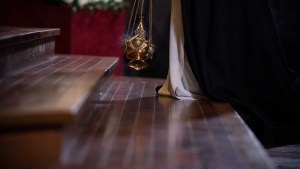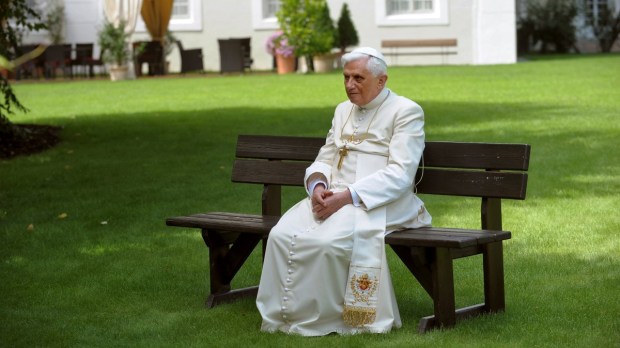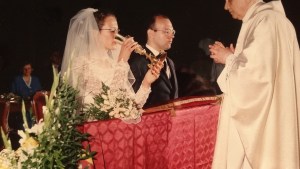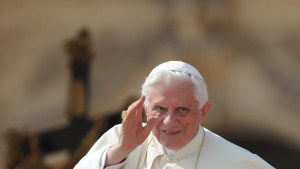In No Country for Old Men, Tommy Lee Jones’ character tells his wife at breakfast that he had dreams last night. “Anything interesting?” she asks. He answers: “They always is to the party concerned.”
Stories about meeting or seeing the pope are a bit like dreams: interesting to the party concerned, but a dime a dozen. However, in light of the passing of Pope Benedict XVI – who was not only the pope, but also a renowned teacher and scholar – I thought I would, at the risk of boring readers, share my own personal remembrance of hearing him speak during his visit to Yonkers, New York.
It was April of 2008, and my wife (then girlfriend) asked me to join her on a school-sponsored trip to see Pope Benedict XVI, who was visiting the United States, at St. Joseph’s Seminary. I was a senior in college at the time, and I wasn’t particularly interested in the religion of my youth or its official representatives. I had mostly stopped going to Mass. Instead, my mind was absorbed with art and existentialism —especially the thought of Søren Kierkegaard, whose book Two Ages had become the focal point of a senior thesis about the ill effects of the internet age.
Grudgingly, I went – and, like any good existentialist, I was probably in a bad mood. Still, the young crowd of students and seminarians surrounding me was exuberant, filled with a joy and energy I didn’t understand. When the Pope finally arrived and got up to speak, his German accent – filtered through a gentle and soft-spoken demeanor (some “Rottweiler” he was!) – was difficult to decipher.
But there was one line of his speech that I heard loud and clear. It rang out like a gong in my mind: “Do not be afraid of silence.”
I couldn’t take in most of the theological and religious content of what he was saying – it went right in one ear and out of the other – but this, I heard. It was primarily a philosophical insight, not a religious one. We are afraid of silence.
Through my study of Kierkegaard, Nietzsche, and other existentialists, I had come to a rather pessimistic view of the modern world. Philosophers were searching for truth, but the restless crowds commuting and consuming were searching for untruth. The internet, cell phones, social media, and the 24-hour news cycle only intensified this whirlwind. I was wrestling with a world, as T.S. Eliot put it, “distracted from distraction by distraction.”
But suddenly I had found an elegant reiteration of this insight in a very unexpected place: the Catholic Church. In fact, I would later come to see that this existential theme pops up again and again in Catholic literature. Pascal, a contemporary of Descartes, remarked as he looked out into the abyss of the night sky: “The silence of these infinite spaces fills me with dread.”
In his novel Lancelot, Walker Percy, a Kierkegaardian Catholic, has the title character make this startling discovery about himself:
“Can a man stand alone, naked, and at his ease, wrist flexed at his side like Michelangelo’s David, without assistance, without diversion, without drink, without friends, without a woman, in silence? Yes. It was possible to stand. Nothing happened. I listened. There was no sound: no boats on the river, no trucks on the road, not even cicadas. What if I didn’t listen to the news? I didn’t. Nothing happened. I realized I had been afraid of silence.”
The same point was recently reiterated by Cardinal Sarah in his excellent work on The Power of Silence:
“Without noise, man is feverish, lost. Noise gives him security, like a drug on which he has become dependent. With its festive appearance, noise is a whirlwind that avoids facing itself. Agitation becomes a tranquilizer, a sedative, a morphine pump, a sort of reverie, an incoherent dream-world. But this noise is a dangerous, deceptive medicine, a diabolic lie that helps man avoid confronting himself in his interior emptiness.”
The alternative to noise is to lay bare what Nietzsche once called the labyrinth of the heart – a terrifying prospect indeed. Silence reveals, as Nietzsche also said, that we knowers don’t know who we are. What we do know – what we’ve done, what we want to do, what we’re afraid to do – we don’t particularly like. No wonder Cardinal Sarah concludes the above passage with this blunt statement: “The awakening will necessarily be brutal.”
Yet Catholicism does not simply echo this theme; it elevates it. The Church is not completely against modern technology – it sees the great good in it – but it does stand against its excessive use to the degradation of the soul.
Silence is a struggle because it allows the self to meet itself at the level at which God meets it: in the hidden, quiet recesses of our innermost thoughts and desires. If silence makes us afraid, our task is not to run or hide from that silence, nor to find peace in it through our own spiritual techniques. Our task is to discover the God who dwells there; to open ourselves up to the painful change of his grace; and to come to know his perfect love, which casts out all fear.
This is why the Church has a long tradition of monastic men and women seeking God in silence. And there is also a kind of monastic silence available to everyone, at any time, and likely somewhere near you: Eucharist Adoration. The basic idea of Adoration is simple: you go into a chapel, you are submerged in silence, and you look at God — and God looks back at you.
I didn’t appreciate it then, but it’s no wonder that Pope Benedict immediately followed his admonition not to fear silence with a reference to Adoration: “Listen to God, adore him in the Eucharist.”
This past year, I had the great privilege of editing The Holy Hour for Word on Fire, and I included a whole section on the theme of “waiting in silence.” As I reflect on it, Pope Benedict XVI’s words helped draw me, in the long run, toward the richness of silent Adoration.
In the months to follow, through various other experiences and influences (and ultimately, God’s grace), I would begin my gradual journey back into the life of the Church. Yet hearing these six words by the Pope in 2008 was an important step in that journey. It told me that the Church was perhaps more wise and worthy of my attention than I had previously thought – that it knew and cared about the things I knew and cared about.
If a single line from a single speech could have such an impact, the mind reels to think just how much of an influence Benedict XVI has had on countless people through his many addresses, encyclicals, and books. He was not only a pope; he was a wise, gentle, grandfatherly teacher. Heaven rejoices to receive him, and he will be missed here on earth; may his words continue to resonate on the bridge between.




